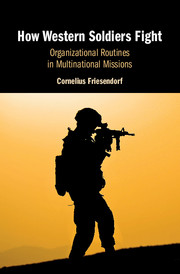Crossref Citations
This Book has been
cited by the following publications. This list is generated based on data provided by Crossref.
Friesendorf, Cornelius
2019.
British operations among the people and civilian risk.
Small Wars & Insurgencies,
Vol. 30,
Issue. 3,
p.
615.
Rietjens, Sebastiaan
and
Ruffa, Chiara
2019.
Understanding Coherence in UN Peacekeeping: A Conceptual Framework.
International Peacekeeping,
Vol. 26,
Issue. 4,
p.
383.
Abbondanza, Gabriele
2020.
The West’s Policeman? Assessing Italy’s Status in Global Peacekeeping.
The International Spectator,
Vol. 55,
Issue. 2,
p.
127.
Ekhaugen, Lene
2021.
Discretion and military frontline workers: investigating civil-military relations policies in Afghanistan.
Small Wars & Insurgencies,
Vol. 32,
Issue. 8,
p.
1394.
Ruffa, Chiara
2021.
The Yin-Yang Military.
p.
101.
Dworschak, Christoph
and
Cil, Deniz
2022.
Force Structure and Local Peacekeeping Effectiveness: Micro-Level Evidence on UN Troop Composition.
International Studies Quarterly,
Vol. 66,
Issue. 4,
Farrell, Theo
2022.
Military adaptation and organisational convergence in war: Insurgents and international forces in Afghanistan.
Journal of Strategic Studies,
Vol. 45,
Issue. 5,
p.
718.
Podder, Sukanya
and
Roy, Kaushik
2022.
Use of force to protect civilians in United Nations peacekeeping: Military culture, organisational learning and troop reticence.
Civil Wars,
p.
1.
Renic, Neil C
and
Kaempf, Sebastian
2022.
Modern Lawfare: Exploring the Relationship between Military First-Person Shooter Video Games and the “War is Hell” Myth.
Global Studies Quarterly,
Vol. 2,
Issue. 1,
Friesendorf, Cornelius
2022.
Supporting Democratic Policing in Central Asia: Limitations of the OSCE.
Europe-Asia Studies,
Vol. 74,
Issue. 8,
p.
1433.
Vignoli, Valerio
Ostermann, Falk
and
Wagner, Wolfgang
2022.
Ideological Talk, Strategic Vote: German Parties’ Positions on the Military Intervention in Afghanistan in Parliament.
German Politics,
p.
1.
Leonhard, Nina
and
Biehl, Heiko
2023.
Militärsoziologie – Eine Einführung.
p.
555.
Ruffa, Chiara
and
Rietjens, Sebastiaan
2023.
Meaning making in peacekeeping missions: mandate interpretation and multinational collaboration in the UN mission in Mali.
European Journal of International Relations,
Vol. 29,
Issue. 1,
p.
53.
Droff, Josselin
Malizard, Julien
and
Schmitt, Olivier
2023.
When Military Interventions Decrease Military Power. Evidence from the French Case.
Defence and Peace Economics,
p.
1.
Shield, Ralph
2024.
Rwanda’s War in Mozambique: Road-Testing a Kigali Principles approach to counterinsurgency?.
Small Wars & Insurgencies,
Vol. 35,
Issue. 1,
p.
80.





